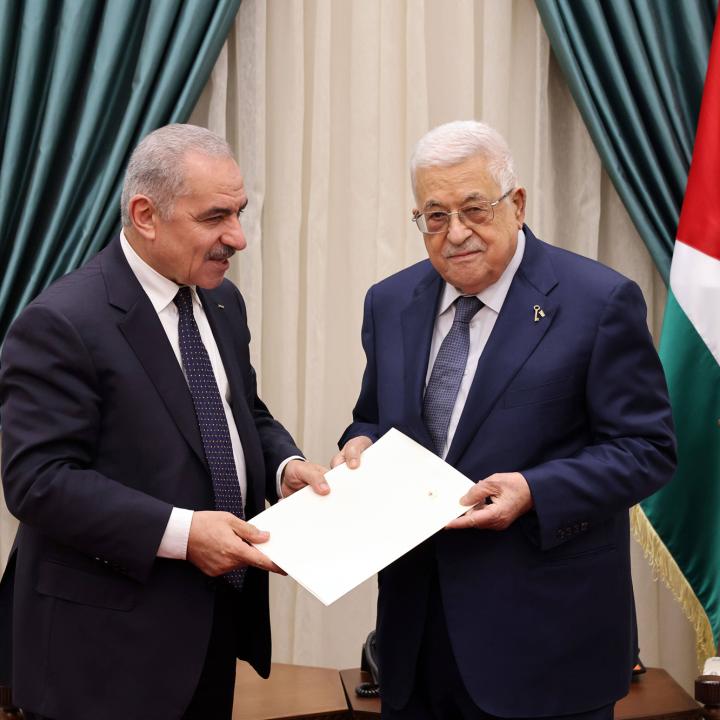
- Policy Analysis
- Policy Alert
Real PA Reform Requires More Than Just a New Prime Minister

Neither the Palestinian public nor the international donor community will support a PA return to Gaza unless the next cabinet is given room to implement serious security, financial, and political reforms.
On February 26, Palestinian Authority president Mahmoud Abbas accepted the resignation of Prime Minister Mohammad Shtayyeh and his cabinet. A member of the Fatah Central Committee who has served as premier since 2019, Shtayyeh is stepping down amid growing U.S., European, and Arab calls to reform the PA. The goal is for Ramallah to play a role in humanitarian, reconstruction, and governance efforts in postwar Gaza and, ultimately, reassume control over the Strip. Does this announcement signal that the PA leadership is willing to consider genuine reform, or is it simply a maneuver to ease international pressure?
Empowering the Next Government
Shtayyeh’s replacement has yet to be officially designated. To be credible, however, any candidate will need to be seen as independent and empowered—particularly in the financial and security spheres. This is essential not only for domestic Palestinian purposes, but also for the sake of sustainable postwar arrangements in Gaza.
In the short term, expecting the PA to implement a full takeover is unrealistic. Yet donors need to be convinced that it is sufficiently reformed, capable, and financially transparent to play a progressively increasing role in managing reconstruction and governance—all without diverting assistance to unintended purposes. Similarly, international actors will be reluctant to get involved in transitional arrangements unless they are sure the PA is serious about building the necessary security capabilities.
In the longer term, the presence of a reformed, capable PA is also necessary to achieving a two-state solution or even taking steps in that direction. Otherwise, the outcome would likely be another failed state in a region rife with such destabilizing models.
Two questions will determine whether these conditions are met. First, will the new prime minister be empowered to undertake the necessary reforms? The next government’s top agenda items are daunting—they include rebuilding and expanding the security forces to resume control in the West Bank and, more gradually, Gaza, as well as creating a transparent, trusted public finance system to serve as a conduit for international assistance and reconstruction funds. These tasks cannot be achieved amid constant interference by other Palestinian power centers. The more independent Shtayyeh’s replacement is, the more confidence there will be in the prime minister’s ability to confront Abbas and senior Fatah figures, many of whom will likely try to undermine meaningful reform. Independence does not mean lack of factional affiliation, but designating someone who is too close or deferential to Abbas would cast doubt on the move’s significance.
Second, who will control the cabinet formation process? The extent to which these appointments are dictated by Abbas or the Fatah Central Committee will be an early indicator of the prime minister’s future prospects. Particular attention should be paid to the choice of interior minister (who has jurisdiction over the security services) and finance minister. Historically, both of these portfolios have been subject to heavy interference from the president and Fatah.
Other indicators bear watching as well. For instance, will the next cabinet be a true technocratic government in which expert ministers are appointed, or a so-called “national consensus” government whose members are chosen by various factions, including Hamas? Any sign that the government includes figures close to Hamas would make it unacceptable to the international community. Moreover, will the cabinet include youth representation, or will it be dominated by older, more traditional figures? Deep reform is much less likely in the latter scenario.
Legitimacy Problems
Besides these questions about empowerment, it is unclear whether simply changing the prime minister and cabinet will be enough to jumpstart the PA’s political rehabilitation. Reassuming control in Gaza requires more than just enhanced operational capabilities—it also depends on the people’s willingness to accept the PA’s rule.
Recent polls indicate that around 60 percent of Palestinians want to dissolve the PA and around 90 percent want Abbas to resign. Appointing a new prime minister may not be enough to fix this wider legitimacy problem, especially if there are doubts about the next cabinet’s independence and empowerment. Without clear signs that larger changes are in the works, public trust in the PA will remain low. And beyond the immediate priority of reforming the PA, longer-term change will require reenergizing Fatah and reforming the Palestine Liberation Organization (PLO), both of which are led by Abbas.
Implications for U.S. Policy
Once the next prime minister is named, the Biden administration’s reaction will be seen as an indicator of Washington’s resolve about PA reform. Hence, U.S. officials should make clear that Shtayyeh’s replacement needs to be independent and empowered. They should also note that U.S. pressure to reform will not end just because a new prime minister is appointed.
In the longer term, rehabilitating the PA requires a more comprehensive and ambitious approach, and this starts with rejuvenating its political leadership. The blueprint for such an approach was first suggested by President George W. Bush in a 2002 speech outlining a political horizon for Israeli-Palestinian peace and the steps needed for its realization. The most important steps were clear: establishing a new Palestinian leadership and hitting a series of reform benchmarks. These proposals provided a political umbrella for a U.S.-led diplomatic process that culminated in the “Quartet Roadmap” and the only serious PA reform effort to date, spearheaded by then-prime minister Salam Fayyad.
For such an approach to succeed today, U.S. leadership is necessary but not sufficient. PA leaders will likely try to blunt American pressure by seeking support from other foreign donors. The Biden administration must therefore ensure that key regional and international stakeholders are on board with the above approach and conveying a similar message to the PA.
Ghaith al-Omari is the Gilbert Foundation Senior Fellow at The Washington Institute and a former advisor to the PA.



